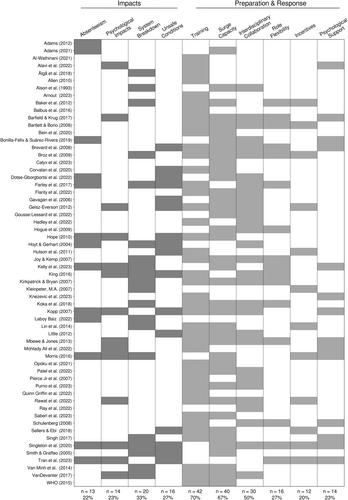Bolstering health systems to cope with the impacts of climate change events: A review of the evidence on workforce planning, upskilling, and capacity building
Abstract
Background
As global CO2 emissions continue to rise and the ‘era of global boiling’ takes hold, the health workforce must cope with the challenge of providing care to increasing numbers of patients affected by climate change-related events (e.g., hurricanes, wildfires, floods). In this review, we describe the impacts of these events on the health workforce, and strategies responding to these challenges.
Methods
This rapid systematic review was guided by the Preferred Reporting Items for Systematic reviews and Meta-Analyses and a registered protocol (PROSPERO CRD42023433610). Eight databases were searched in May 2022 and again in June 2023. Empirical studies discussing climate change and workforce policy, planning, preparedness, and capacity were included. Inductive thematic analysis of extracted data was conducted.
Results
From the 60 included studies, two categories emerged: the impacts of climate events on the health workforce (n = 39), and workforce responses to and preparations for climate events (n = 58). Thirty-seven studies reported on both categories. Four impact themes were identified: absenteeism, psychological impacts, system breakdown, and unsafe working conditions; and six responses and preparations themes: training/skill development, workforce capacity planning, interdisciplinary collaboration, role flexibility, role incentivisation, and psychological support.
Conclusion
This review provides an overview of some of the deleterious impacts of climate events on the health workforce, as well as potential strategies for the health workforce to prepare or respond to climate events. Future studies should assess the implementation and effectiveness of these strategies to ensure a continuously improving healthcare system, and a well-supported health workforce.


 求助内容:
求助内容: 应助结果提醒方式:
应助结果提醒方式:


